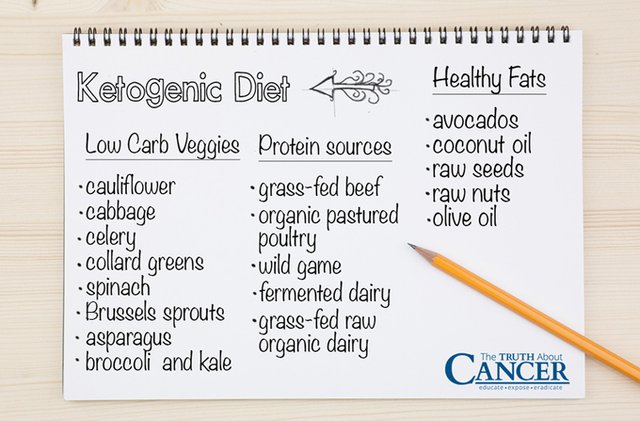KETOGENIC DIET;
Chronic disease continues to ravage our world today despite tremendous advances in health care. Therapeutic approaches to treating this wide-range suffering cannot be met by technological growth in pharmacology, genetic therapy, or surgery. It should be obvious that the real solution for treating cancer and disease is not found in a man-made pill but rather is found in regulating the metabolic functions within our bodies.
Western cultures today enjoy a diet rich in the delicacies that our ancestors did not consume on a regular basis such as grain, sugar, and starch. Research continues to show that sugar is the main source of fuel which feeds cancer and contributes to an inflammatory environment. Sugar essentially increases the risk for cancer and disease.
*The Ketogenic Diet Starves Cancer
Otto Warburg was a leading cell biologist who led to the discovery that cancer cells are unable to flourish using energy produced from cellular respiration, but instead from glucose fermentation. Dr. Thomas Seyfried and other cancer researchers agree, and have further discovered that cancer cells are also fueled from the fermentation of the amino acid glutamine.
With ketogenic diets, lowering carbohydrates will reduce your levels of glucose, the fuel that feeds cancer cells. This will put your body into ketosis and will assist in depleting cancer cells of their energy supply.
Cancer cells are unlike normal cells in many ways, but one of their traits that is most unique regards insulin receptors. They have ten times more insulin receptors on their cellular surface. This enables cancer cells to gorge themselves in glucose and nutrients coming from the bloodstream at a very high rate. As you continue to consume glucose as your primary diet source, cancer cells will continue to thrive and spread. It is no surprise that the lowest survival rate in cancer patients is among those with the highest blood sugar levels.
Cancer cells have damaged mitochondria and lack the ability to create energy from aerobic respiration. They cannot metabolize fatty acids for energy. For this reason, cancer cells thrive in oxygen-depleted environments. Instead, cancer cells metabolize glucose and amino acids. Restricting glucose or the amino acid glutamine is essential to starve off cancer
How the Ketogenic Diet Works
What is the Ketogenic Diet?
The Eskimos and Maasai group are cultures we often look at to learn how their scant consumption of carbohydrates sustained their bodies through harsh weather conditions. It turns out that their low carb diet switched their metabolism to burn fat instead of sugar or glucose.
This created a metabolic state known as ketosis, a process in which the body burns ketones to make energy, instead of relying on sugar or carbohydrate.
Ketones are metabolized by fatty acids in the liver for energy. (This source of fuel is capable of crossing the blood brain barrier and is an excellent form of energy for neurons.) When the body lacks glucose, which is its first source of fuel, ketones are created in its absence.
Ketosis was a beneficial process the human body developed as an adaptation to times when food was unavailable (such as for these hunter-gatherers). However, you can effectively produce ketones too by limiting the carbohydrates in your diet to less than 80 grams daily and protein to no more than 1.2 grams of protein/per kg lean body mass. As the body adapts to the use of ketone metabolism over time, the hormone in the liver that is essential to ketone metabolism (known as FGF21) becomes more efficient.

Intermittent Fasting and Cancer Prevention
The ketogenic diet is particularly effective when combined with periods of intermittent fasting. Fasting increases ketone production and can starve cancer cells. Late stage cancer patients can further weaken their cancer cells by completing a lemon water cleanse for three to seven days.
In today’s modern diet, snacks and meals have us eating up to five times a day, preventing any sort of intermittent cell fasting. As nutrition is constantly supplied, blood sugar levels remain elevated, insulin levels remain high, and the fuel source needed for cancer cells to develop and grow remains a constant threat.
A lifestyle of fasting may involve an individual eating for a period of only 4-8 hours in one day. A 20-hour fast may involve eating food between 3pm and 7pm each day. This regular intermittent fasting lifestyle allows the body to produce ketones in order to fuel the entire body. The 20-hour fast may be optimal for individuals with the diagnosis of cancer, but may otherwise be incorporated into your lifestyle using a 16 to 18 hour fasting period.
Ketogenic Diet Meal Plans that Kill Cancer

The ketogenic diet consists of a meal plan centered around healthy fats. These include:
avocados
coconut oil
butter
raw seeds and nuts
olive oil
eggs
The diet also allows low carbohydrate vegetables such as:
cauliflower
cabbage
celery
collard greens
spinach
Brussels sprouts
asparagus
broccoli
kale
Protein sources in a ketogenic diet generally come from:
grass-fed beef
organic pastured poultry
wild game
fish and seafood
fermented dairy
grass-fed raw organic dairy (full fat)
Organic acids, antioxidants, and enzymes are recommended to help the body develop an alkaline environment. When organic acids are metabolized, foods such as low-sugar fermented drinks, dried herbs, lemon, lime, and apple cider vinegar help to weaken cancer cells by neutralizing acidity and increasing cellular oxygenation.
Diets high in protein are also capable of feeding cancer. A moderate protein diet is recommended on the ketogenic diet in order to weaken cancer cells. You can starve cancer by practicing a ketogenic diet consisting of an abundance of healthy fats (about 75 percent), only 20 percent protein, and no more than 5 percent carbohydrates.
Creating Optimal Hormone Sensitivity with a Ketogenic Diet
The ketogenic diet is designed to allow an individual to feel satisfied easily as a result of optimal insulin and leptin sensitivity. For example, a man weighing 150 pounds should consume 30-50g/day of carbohydrates and less than 70g/day of protein to maintain an optimal state of ketosis. When only a single meal or two is consumed consisting of approved ketogenic foods, this is easy. The ideal blood sugar concentration for weakening cancer cells is between 60-70mg/dl, and ketone levels are recommended between 4-7mM.
While practicing the ketogenic diet, it is also recommended to supplement with high quality (non-synthetic) multivitamins, probiotics, and omega-3s. Omega-3 supplementation has been found advantageous to stimulating the anti-cancer effects of the ketogenic diet.
Source
Plagiarism is the copying & pasting of others work without giving credit to the original author or artist. Plagiarized posts are considered spam.
Spam is discouraged by the community, and may result in action from the cheetah bot.
More information and tips on sharing content.
If you believe this comment is in error, please contact us in #disputes on Discord
Downvoting a post can decrease pending rewards and make it less visible. Common reasons:
Submit
Hi! I am a robot. I just upvoted you! I found similar content that readers might be interested in:
https://thetruthaboutcancer.com/ketogenic-diet-weakens-cancer-cells/
Downvoting a post can decrease pending rewards and make it less visible. Common reasons:
Submit